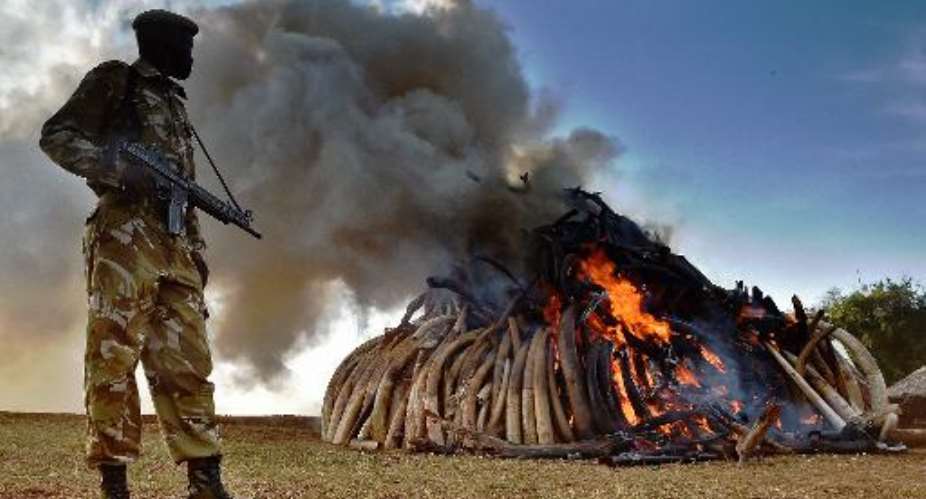Kasane (Botswana) (AFP) - Conservation experts meeting in Botswana on Wednesday issued dire warnings over the booming illegal wildlife trade that threatens the survival of elephants, rhinos, tigers and other endangered species.
Stressing that poaching was "growing problem", delegates from 30 countries underlined their commitment to pledges made at a conference in London last year that was hailed as a turning point in the fight to protect rare animals.
But the event in the town of Kasane came up with few new ideas on how the tackle the damage wrought by illegal traffickers on species ranging from elephants and tigers to sea turtles and pangolins.
"Important battles are being won as remedial efforts increase in quality and quantity, but overall the picture remains deeply worrying," said Steve Broad, director of TRAFFIC, the wildlife trade monitoring group.
"Illicit trafficking of tiger skin and bones remains persistent. The parts of almost 1,600 tigers were seized in tiger-range countries over the past 15 years.
"With barely more than 3,000 tigers left in the wild, such levels of illegal trade are disastrous."
The conference ended with a declaration stressing the need to improve cooperation between countries on trading routes, to strengthen prosecution mechanisms, and to ensure local communities benefit from conservation.
"Despite efforts to date for many species, the illegal trade, and the poaching which fuels it, is an ongoing and growing problem," the delegates' final statement said.
The outcome of the much-heralded conference sparked anger among some conservation groups.
"It is appalling that countries like Chad, Cameroon and the Democratic Republic of Congo (DRC)... can't show any headway whatsoever in slowing the slaughter," Jason Bell, of the International Fund for Animal Welfare (IFAW), said in a statement.
"In Garamba National Park in the DRC, 30 elephants were killed in the week running up to this conference."
The IFAW said that 15 of the 41 countries which signed up to last year's London declaration had provided no evidence that they were delivering on their commitments.
- Chinese demand for ivory -
One challenge to ending illegal wildlife trading is how to reduce demand for products from endangered species, especially in China where smuggled ivory is highly valued.
Ivory is often traded from Kenya and Tanzania, via Vietnam and the Philippines, to Thailand and China, where sculptured pieces are prized as artworks or jewellery.
It is reportedly bought at $100 (91 euros) per kilo ($45 or 41 euros per pound) from poachers, and is sold for $2,100 in China.
"The international wildlife trade matters because it drives corruption and instability (and) because wildlife resources are being stolen from communities on a scale never seen before," British politician Lord de Mauley told the conference.
"It threatens the very existence of some of the world's most iconic and treasured species.
"We must seize this opportunity. Because the time to act is now."
The trade is worth $19 billion a year, according to the IFAW.
Some of the cash is reported to fuel local conflicts and militancy.
"We are particularly concerned by the knowledge that terrorist groups are looking for new sources of funding through ivory trade," Botswana President Ali Bongo told the conference in Kasana, close to country's famous national parks.
Some African elephants have been forced to flee regional unrest, according to Mike Chase, founder of Elephants Without Borders.
"In the case of Botswana, lots of our elephants are essentially political refugees, fleeing persecution in neighbouring countries," he said.
Botswanan Minister of Environment Tshekedi Khama appealed for all African nations to commit to saving endangered species -- despite financial pressures.
"I'm fully conscious that our economies are struggling to recover from the recent economic downturn, but we cannot use this as an excuse for inaction as there will be a bigger price to pay in future," he said.
A conference focused solely on elephants was also held in Kasane this week, with some experts warning that African elephants could be extinct within decades.





 Former Kotoko Player George Asare elected SRC President at PUG Law Faculty
Former Kotoko Player George Asare elected SRC President at PUG Law Faculty
 2024 elections: Consider ‘dumsor’ when casting your votes; NPP deserves less — P...
2024 elections: Consider ‘dumsor’ when casting your votes; NPP deserves less — P...
 You have no grounds to call Mahama incompetent; you’ve failed — Prof. Marfo blas...
You have no grounds to call Mahama incompetent; you’ve failed — Prof. Marfo blas...
 2024 elections: NPP creates better policies for people like us; we’ll vote for B...
2024 elections: NPP creates better policies for people like us; we’ll vote for B...
 Don’t exchange your life for wealth; a sparkle of fire can be your end — Gender ...
Don’t exchange your life for wealth; a sparkle of fire can be your end — Gender ...
 Ghana’s newly installed Poland train reportedly involved in accident while on a ...
Ghana’s newly installed Poland train reportedly involved in accident while on a ...
 Chieftaincy disputes: Government imposes 4pm to 7am curfew on Sampa township
Chieftaincy disputes: Government imposes 4pm to 7am curfew on Sampa township
 Franklin Cudjoe fumes at unaccountable wasteful executive living large at the ex...
Franklin Cudjoe fumes at unaccountable wasteful executive living large at the ex...
 I'll 'stoop too low' for votes; I'm never moved by your propaganda — Oquaye Jnr ...
I'll 'stoop too low' for votes; I'm never moved by your propaganda — Oquaye Jnr ...
 Kumasi Thermal Plant commissioning: I pray God opens the eyes of leaders who don...
Kumasi Thermal Plant commissioning: I pray God opens the eyes of leaders who don...
